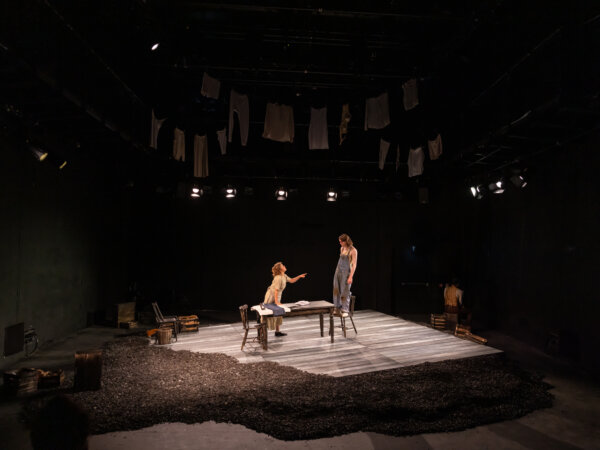Postgraduate Degrees / Theatre Directing
Master of Fine Arts [MFA] in Theatre Directing
1 year / 2 years
The Master of Fine Arts Theatre Directing programme is an one-year-long, practise-based master's programme. Applications for 2026-2027 are now open.
Apply NowOverview
This programme is tailored to provide talented individuals with the necessary skills to pursue a career in professional theatre and related industries. This has a maximum class size of 4 people (full-time).
In addition to the core classes and workshops, individual and group tuition from the Head of Directing of The Lir Academy will be a key feature of the training. In addition, master classes by visiting practitioners will supplement the student experience. Professional placements are a key feature of the programme and all students will showcase their work in public performances at the culmination of the course. Students can opt to take this course either part-time (24 months) or full-time (12 months).
Full-time and part-time students will take three concurrent modules in the first two terms. The final module (Module 5) will be taught in the third term and subsequent summer months (for full-time students) or in the second year of the course (for part-time students) and will culminate with a professional production staged in one of the performance studios at The Lir Academy. Term Three will be supplemented by an ongoing series of master classes from professional directors and theatre makers.
On completion of this postgraduate degree, you will qualify and graduate from Trinity College Dublin, The University of Dublin.
Please note that postgraduate applicants for Trinity College Dublin are expected to have a minimum educational level of an undergraduate degree (Level 8) at a second class honours level of 2:1 as part of the entry requirements for the University. However, due to the practical nature of our MFA programmes, exceptions may be made in circumstances where an applicant demonstrates the talent, aptitude and experience appropriate to the course. To discuss this further, please contact our admissions team - admissions@thelir.ie.
Applications for 2026-2027 are now open via the Trinity portal here. The initial deadline will be in March 2026 and will be unlikely to be extended.
We recommend applying as soon as possible to ensure the best possible chance of securing a place early so that you can then make preparations to start your studies with us in September.
Read our current prospectus here.
Hear from our graduates Joy Nesbitt here and Davey Kelleher here. You can see details of all previous graduates by clicking here.
Read about our annual award for emerging directors - applicable only to Lir graduates at this link.
Read about The Lir Academy Tutors here.
Funding information - please see our website - click here.
Information session recording - if you would like to receive the link to the recording of our recent information session, please contact marketing@thelir.ie
Application Details click to
The application for the programme must be submitted through the specific form available through the Trinity College Dublin website. The online form includes sections where applicants can submit:
a) Résumé/CV: a directing CV, clearly listing education, experience in theatre and theatre directing,
b) References: two reference/testimonials; one from those familiar with your work and one from third level education. It is a good idea to reach out and ensure that those uploading your references are aware of your application and have received the notification to upload their testimonial from Trinity College Dublin,
c) Personal Statement (max. 500 words): In this section, you may include why you wish to attend The Lir Academy, and why you wish to pursue a masters degree. You may expand on this statement within your Statement of Purpose, or you may elect to include this information on the former and indicate in the Personal Statement section that you will do so.
In addition to the information required on the online form submitted through Trinity College Dublin, you are also required to upload a copy of each of the following through the Additional Documents section on the application form:
a) Letter of Application: A letter that outlines your theatre education and theatre directing experience to date. This may also include experience in other areas of theatre as well as directing in film. Please note, however, that applicants will require some
theatre directing experience to be accepted on to the course,
b) Statement of Purpose: A statement outlining your ambitions in terms of theatre directing. In this you can include what theatre is to you, why you have chosen a career in theatre directing, the work you want to make, why you want to pursue a MFA in Theatre Directing and your future plans,
c) Portfolio: outlining your theatre and directing work. We accept portfolios as PDFs, websites or in any other convenient format,
d) Critical Assessment: a critical assessment essay of recently directed work. This is an analysis of a production directed by the applicant. It is an overall evaluation of the process; from the initial artistic impulse, ambitions for the work, pre-production plans and the development of the work; an analysis of the director's process when working with designers, actors, and the production team, and finally a reflection and critical analysis of the work achieved and any learning outcomes.
It would be extremely helpful if you could name the files according to the following format when uploading: NameLastnamePortfolio, NameLastnameCV etc.
APPLY FOR THE MFA THEATRE DIRECTING (BOTH FULL-TIME AND PART-TIME) VIA TRINITY COLLEGE DUBLIN AT THE LINK BELOW.
Modules click to
Contemporary Theatre Practice
This compulsory module will introduce students to a range of contemporary theatre practices. It will focus on Irish and international artists and companies, with a particular emphasis on contemporary productions staged in the theatres of Dublin. The principal aim of the course is to enable students to become conversant in the styles, forms, theories and practices that constitute contemporary theatre making in Ireland and across the world. The Contemporary Theatre Practice module is shared by all Master in Fine Art students (directors, designers and playwrights).
Directing Workshop
In this compulsory module students will investigate various directing processes in a workshop format. Students will work with The Lir’s Head of Directing and visiting directors, as well as professional and student actors. Students will receive both group feedback and individual tuition in the development of their craft. Workshops will cover such areas as: text and a creative world-view; developing an awareness of the professional directing context; developing an explicit, personal aesthetic; working collaboratively with actors and other artists. This module also outlines career development and provides a constructive framework for group and self critique. It introduces research skills and rehearsal etiquette by working in a professional environment. The overall aim of this module is to prepare students to direct a play in the Theatre Production Module.
Theatre Production
This compulsory module aims to enable students to apply the skills acquired in the other Modules to the development of their individual creative voice and practice, and in the direction of a theatre performance of between 30-60 minutes which will be showcased to the professional industry as part of The Lir’s on-going programme of public performances and events. Each student will be individually supervised in pre-production, rehearsals, tech and public performances throughout Term Three and over the summer months. Two Assistant Director placements working alongside professional theatre directors will form a key component of the preparation for the final production.
Dramaturgy for Theatre Directing
This elective module is taught by a professional dramaturge. Its aim is to introduce students to a range of dramatic texts for the theatre with an emphasis on the dramaturgical composition of those texts. An understanding of the contexts within which those dramaturgical strategies were produced will also be fostered. This seminar-based module requires students to examine key problems related to the creation and structure of scripts for performance. Students will consider a variety of theories regarding dramatic structure, consider the research requirements of script creation, explore different approaches to script development and learn to apply a dramaturgical vocabulary to a number of case studies. Similar to the Contemporary Theatre Practice module, Dramaturgy is shared with MFA playwriting students (for whom it is a compulsory module) and MFA design students (for whom it is an elective module) and is supported by specific tutorials focusing on each individual strand of the MFA programme.
Throughout the training students will be develop skills of the practitioners of theatre other than the theatre director, with a view to them becoming proficient in and conversant with the creativity of others, and to enhance the craft of the student director by broadening their experience of theatre making. Students will explore the crafts of the actor, designer, stage manager, production manager and stage technician through workshops with teachers and professionals in the various disciplines.
Fees click to
Fee Status
A breakdown of postgraduate EU fees can be found on Trinity's website.
To determine your fee status, read below.
You can also consult the flow chart provided by Trinity College to determine your fee status:
EU Fees Eligibility
A student is considered eligible for EU fees if they meet one or more of the following criteria:
- The student is ordinarily resident in the EU, EEA, Swiss Confederation or United Kingdom and has received full-time further or higher education in the EU for three of the five years immediately preceding admission;
- The student is ordinarily resident in the EU, EEA, Swiss Confederation or United Kingdom and has worked full-time in the EU for three of the five years immediately preceding admission or
- The student holds a passport from an EU State, EEA, Swiss Confederation or United Kingdom and has received full-time further or higher education in the EU for three of the five years immediately preceding admission.
Applications from children of the following are treated as EU applications:
- EU government officials living abroad
- Semi-state officials who are on assignment in countries outside the EU
- Volunteer development workers
- Certain EU officials as approved by the Department of Foreign Affairs
Non-EU Fees
If you do not satisfy the criteria for EU Fees, then you must pay non-EU Fee rate, regardless of nationality or citizenship (€ 22,8000 - AY 2024/25).
Students classified for fee purposes as non-EU will not be permitted to change their fee status following admission. This fee includes tuition fees and the SLC fee.
Fees for 2024/25
Full-time fees (EU/UK) - €12,530
Full-time fees (Non-EU) - €22,800
Part-time fees (EU/UK) - €6,260 p.a.
Part-time fees (Non-EU) - €13,460 p.a.
Details on additional student fees can be found at the link here.
Annual Review of Tuition fees and other charges by Trinity College Dublin:
Please note, tuition fees and other charges are subject to annual review by Trinity College Dublin which may result in a fee increase each year.
All students (Undergraduate and Postgraduate, EU & Non EU) on courses/programmes of study of more than one year should be aware that tuition fees and other charges (Commencement/graduation fee, Student Levies & Charges (SLC) fee) may be subject to increase annually. The annual revision is approved by Trinity’s Committee and College Board and typically increase by approximately 3% per annum or more in any given year.
For funding opportunities, please this link.
Bursaries and Scholarships click to
1. The Colm Ó Briain Scholarship
This fund will provide a scholarship of €10,000 to be awarded each year to a student on our BA in Acting or our MFA in Theatre Directing programmes. We will soon be accepting applications for this award for the coming academic year, starting in September 2025. For more information on how to apply contact us at admissions@thelir.ie by clicking here.
2. The Emerging Director Award
Following graduation, emerging directors will be eligible to submit to this award, which supports working as an assistant director, remunerated at an industry-standard rate as well as a travel and subsistence allowance and several one-on-one mentorship sessions on a theatre project. This award has been made possible with the support of Dónal McKeating and director Marc Atkinson Borrull. You can read about it at this link here.
3. The Haddad Fellowship
The Haddad Fellowship includes The Lir Academy MFA Playwriting, Stage Design and Theatre Directing courses. It is available for Brazilian students and covers the travel, living and education costs of the course for up to €35.000. Applications for the scholarship open in January each year, and we advise students to apply early. Read more about the Haddad Fellowship and the eligibility criteria at this link.
4. SUSI Grant
The SUSI Grant can be accessed by EU and international students who have lived in Ireland for three out of the past five years. The grant is income-assessed and you can use the Eligibility Reckoner online to see if you qualify at this link.
5.The Lir Academy Bursary
The Lir Academy Bursary is available for EU students and it is income-assessed. Applicants can only apply for it once they have been offered a place. For more information about this contact us at admissions@thelir.ie - click here.
6. Trinity College Dublin Funding
Trinity College Dublin offers a variety of funding opportunities for EU and international students. You can read about them at this links - here.
7. European Excellence Awards
A bursary towards fee costs for EU-fee status students. Applicants can only apply for it once they have been offered a place. Applications usually open in March and close at the end of June each year. If you are an EU-fee status student, you can read more about the European Excellence Awards here.
8. Higher Education Authority for non-EU/EEA countries
Each year the Higher Education Authority (HEA) run an International Education Scholarships Programme - see more here. Under the initiative, 60 scholarships will be provided for one year of study at Bachelor, Masters or PhD levels to successful candidates who have an offer of a place at an eligible Irish higher education institution. The offer is open to students from non-EU/EEA countries and is applicable to all fields of study.
MFA Theatre Directing Course Handbook 2025 - 26 click to
Download the course handbook here
MFA Theatre Directing Course Handbook
“
The MFA in theatre directing at The Lir Academy offered me a practical, rigorous and professional based approach to developing my voice as a theatre director while at the same time supporting me as a student. The school provided me with the space to explore creatively and learn from the industries top theatre directors, designers and technicians. One of the most influential parts of the programme for me was the invaluable opportunity to do an assistant directing placement with ANU productions.
Samantha Cade





